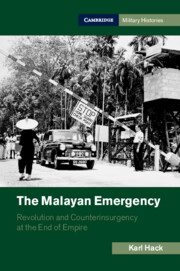Book contents
- The Malayan Emergency
- Cambridge Military Histories
- The Malayan Emergency
- Copyright page
- Contents
- Figures
- Maps
- Tables and Charts
- Preface and Acknowledgements
- Note On the Text: Language, Terminology and Measures
- Abbreviations
- Additional material
- 1 Introduction and Overview
- 2 Fatal Decisions
- 3 Terror, Counter-Terror and Pressure
- 4 Bureaucratic Counter-Terror and MNLA Main Forces
- 5 The Briggs Plan
- 6 Chin Peng and Communist Plans
- 7 Templer
- 8 Optimising Counterinsurgency
- 9 Politics, Decolonisation and Counterinsurgency
- 10 Conclusion
- Appendix 1 Emergency Statistics, 1948 to 1960
- Appendix 2 The Second Emergency, 1968 to 1989
- Glossary
- Bibliography
- Index
10 - Conclusion
Published online by Cambridge University Press: 16 December 2021
- The Malayan Emergency
- Cambridge Military Histories
- The Malayan Emergency
- Copyright page
- Contents
- Figures
- Maps
- Tables and Charts
- Preface and Acknowledgements
- Note On the Text: Language, Terminology and Measures
- Abbreviations
- Additional material
- 1 Introduction and Overview
- 2 Fatal Decisions
- 3 Terror, Counter-Terror and Pressure
- 4 Bureaucratic Counter-Terror and MNLA Main Forces
- 5 The Briggs Plan
- 6 Chin Peng and Communist Plans
- 7 Templer
- 8 Optimising Counterinsurgency
- 9 Politics, Decolonisation and Counterinsurgency
- 10 Conclusion
- Appendix 1 Emergency Statistics, 1948 to 1960
- Appendix 2 The Second Emergency, 1968 to 1989
- Glossary
- Bibliography
- Index
Summary
The conclusion gives sweeping summaries of four different angles on the Emergency and of how they inter-relate. These are the government perspective, the insurgent perspective, the local perspective and the perspective of practitioners and scholars who have held the Malayan Emergency up as a counterinsurgency case study for global study, if not emulation. In so doing the Conclusion rejects myths about the primacy of violence and of hearts-and-minds measures alike, instead showing how strong control and big operations remained key to destroying the influence of MCP committees where they remained influential, even as persuasive measures and white areas became more important elsewhere. The Conclusion also revisists the question of violence and harm, highlighting how their intensity and prevalence changed markedly over different conflict phases. Terror and government counter-terror (‘pressure’) were high in 1948, transmuting into structural harm in 1949, and were replaced by a determination to outbalance harms with social goods as resettlement acccelerated across 1950–2. It finishes with the hope that the book’s sensitivity to variegation across place and time will inform future studies, and future debates about causation, impact and significance of the Emergency, both for Malaysia itself and for more universal study of counterinsurgency.
Keywords
- Type
- Chapter
- Information
- The Malayan EmergencyRevolution and Counterinsurgency at the End of Empire, pp. 432 - 454Publisher: Cambridge University PressPrint publication year: 2021

